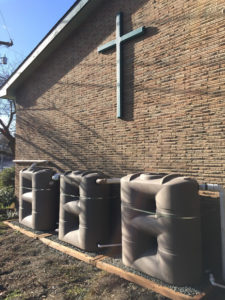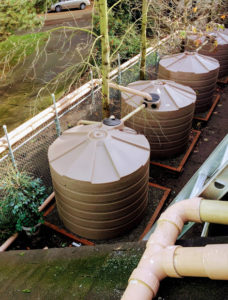 On April 10, 2018, Samaritan Center of Puget Sound hosted a festive gathering to celebrate the installation of seven new cisterns at the main office on Ravenna Blvd. This project was a cooperative effort involving Samaritan Center, RainDog Design (contractor), and RainWise (initiator and funder). RainWise is a joint program of Seattle Public Utilities and King County’s Wastewater Treatment Division.
On April 10, 2018, Samaritan Center of Puget Sound hosted a festive gathering to celebrate the installation of seven new cisterns at the main office on Ravenna Blvd. This project was a cooperative effort involving Samaritan Center, RainDog Design (contractor), and RainWise (initiator and funder). RainWise is a joint program of Seattle Public Utilities and King County’s Wastewater Treatment Division.
Installation of the cisterns helps control storm water, a significant source of pollution in Lake Washington, Puget Sound, Lake Union, and the Duwamish River. “We take our agency name, in part, from Puget Sound,”said Jim Ramsey, a Samaritan therapist who also oversees the physical plant of the Green Lake office, “so it seemed natural that we play a small part in maintaining the health of an immensely valuable regional resource.”

Samaritan Center of Puget Sound ‘s newly installed cisterns will capture runoff from 100% of their roof area, effectively keeping 30,159 gallons of storm water out of the combined sewer system each year. With the new cistern capacity at Samaritan Center, the RainWise Program now has more than 1400 participants. By channeling storm water runoff from over 40 acres of impervious rooftops to green infrastructure facilities such as rain gardens or cisterns, these properties are keeping millions of gallons of runoff out of the combined storm water/sewer system, and controlling overflows in local water bodies during heavy rains.
Samaritan Center urges other businesses, neighbors, churches, and community organizations in eligible basins to take advantage of this program. Private property owners in the Greenlake, University District, Maple Leaf neighborhoods and many others throughout Seattle are eligible for RainWise rebates. Rebates may cover up to 100 percent of the cost to install a cistern or rain garden.
